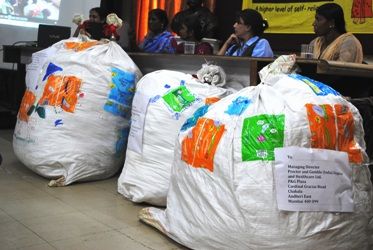
In large cities, there are two to three tiers of waste buyers, all very well organised and specialised in specific wastes, notes Sunita Narain
Last fortnight, I discussed the need to reinvent garbage management in our cities so that we can process waste and not ‘landfill’ it (‘In need of a landfill tax’, May 9, 2016).
This, as I wrote, required households and institutions to segregate their waste at source so that it could be managed as a resource. It also means that we need to limit how much is dumped by imposing a tax on landfills.
I want to follow up on this idea this fortnight.
First, this reinvention means that we need to incorporate, instead of negating the role of, the recycling industry in waste.
Currently, it is said (although the data is weak) that recycling of dry waste provides employment to about one to two per cent of a city’s population, often the poorest women and children.
In large cities, there are two to three tiers of waste buyers, all very well organised and specialising in specific wastes.
What is not recognised is that this trade -- which happens in the backyards of our slums and is shoved aside by policy -- is the only thing saving cities from completely drowning in waste. It is also this trade which ensures that less waste reaches landfills.
There is a great need for official support to this unappreciated activity that saves the city at least 10-15 per cent in daily transportation costs, adding up to lakhs of rupees a year.
Over the years, civil society groups working with informal waste collectors have worked on several policies to promote this business -- starting a dialogue to find out the needs of this sector, issuing ID badges to street waste pickers who desire them (through non-governmental organisations or police, to prevent harassment), providing them with sorting and storage space, and providing a doorstep pickup service for post-sorting rejects to be taken away from slum houses or waste-buyer’s yards, so that these do not end up clogging the storm-drains.
New ventures are also emerging to take the stigma out of this garbage sorting business.
In the capital, ventures like Raddi Express, Raddi Bazaar and in Mumbai Raddiwala have all made paper collection an easy and profitable business.
At the macro-level, it is worth mapping, within the state or even nationally, the location of major recyclers of specific wastes and encouraging the filling of perceived gaps.
Policies are needed to help this waste-reducing and partially pollution-abating industry to become legitimate -- through designated recycling eco-parks, concessional power rates and low or no sales taxes.
Currently, city master plans do not even allocate space for this business.
It is considered illegal, dirty and something that must go away. This is what has to change.
The Kerala government has found that the only way it can manage its dry waste is by activating its informal recycling industry.
The state government’s Suchitwa Mission -- for a garbage-free Kerala – has collated information on this industry and put the data, including the rate paid for different categories of waste, on its official website.
Now, households can use this service. It has also started a company to manage its plastic waste and to work with recyclers.
Secondly, we also need to accept that waste management costs. But currently municipalities hardly charge for this service.
The assumption is that waste management is included in property tax.
But as property tax is rarely computed for this service and in most cities rarely charged, the real cost of waste management never happens.
This is why municipalities struggle to pay for this service.
Matters are made worse because municipal accounts are a mess -- most urban local bodies do not even maintain annual accounts.
This lack of finances for basic municipal services is compounded by the fact that citizens do pay for waste management -- but not to the municipal body.
In most cities, residents -- particularly in affluent (and so waste-generating) households have engaged private agencies to undertake door-to-door collection.
The household pays for this service.
But the agency then takes the waste and dumps it (invariably) in the municipal secondary collection station.
The transportation and processing of the waste is then left to the already depleted finances of the local body.
It is also clear that the household must be made to pay based on the generation of waste and penalised if the waste is not segregated.
It is time we accepted that each household or commercial establishment is a waste generator and so a potential polluter.
The principle of polluter pays must be applied. Otherwise, our cities will become giant garbage fields.
But the real game-changer in garbage management is NIMBY -- Not-In-My-Backyard.
Poor and rural communities are beginning to object to the waste being dumped in their backyard.
They, like us, do not want to live near a landfill or a waste incinerator that pollutes.
So, now that their backyard is not available, in whose front yard will waste be disposed of?
If it is ours, then we will need to keep it clean. Won’t we?
Sunita Narain is at the Centre for Science and Environment










